A discussion about “Yeezus,” the latest offering from Kanye West, must begin by acknowledging the polarizing nature of such an album.
On the one hand, it is an incredible listen from a production standpoint, and the percussive, hypnotic melodies showcase West at his most ambitious. The experimental nature of West’s production creates a 40-minute album that is alternatingly inspiring and jarring, but never boring. The album opens with synthesized tones, blasting angry and flatulent, which West uses as a staging ground from which to launch his defiant EDM-infused odyssey. It is progressive and genre defying, and the overall listening experience is quite exciting. That is, as long as you can ignore West’s lyrics, which leads me to the second half of this review.
While “Yeezus” is bold and exciting from a production standpoint as an EDM or dance-pop record, it’s a truly abysmal hip-hop album. In fact, it is a terrible hip-hop record. It ranks among the worst hip-hop albums of all time, if the listener listens to the lyrics or West’s flow. This juxtaposition of brilliant production coupled with uninspired, poorly delivered lyricism, leads to a deeply frustrating listening experience.
West’s lyrics, as well as his sampling choices, are marked by an incredible lack of sensitivity and self-awareness, with heavy elements of misogyny and casual racism mixed in for good measure. West has been known for his narcissism and entitlement for most of his career, but those traits have finally overtaken West completely and he’s 100 percent id on “Yeezus.” The deeply vulnerable and human Kanye who bared his soul with tracks such as “Through the Wire,” “Diamonds from Sierra Leone,” “Lost in the World” and “Runaway” has disappeared. In his place, we have a clown who brags about how he’s “gonna start a new movement, being led by the drums,” apparently unaware of the minimalistic, drum-led hip-hop of the 1980s. We are treated to a sample of Nina Simone’s version of “Strange Fruit” with zero appreciation for its status as a song recounting the atrocities of Southern racial violence. Simone produced a haunting rendition of Billie Holliday’s song about Southern black bodies “waving in the summer breeze” after lynchings, and how Southern trees bore “strange fruit.” Kanye borrows from this song to produce an auto-tuned anthem devoted to his gold-digging acolytes, spending money, taking MDMA and Instagram. This is just the tip of West’s offensive lyrical iceberg. From rapping about how he is going to “Put my fist in her like a civil rights sign” or paraphrasing Martin Luther King’s groundbreaking “I Have a Dream” speech to reference a woman exposing her breasts, West’s lack of sensitivity is sure to upset anyone who bothers to listen to the words of his songs.
I appreciate how Hip-hop is supposed to be subversive and offensive. Historically, rap music has provided outlets for expression in ways that the powers-that-be deem inappropriate. However, the best hip-hop has always been intelligent and marked by social awareness. West is neither socially aware nor intelligent. Sure, the rapper is talented, but is he smart?
It’s time for a pop quiz, Aztecs. Were the 300 Spartans made famous by the Battle of Thermopylae (or the Frank Miller graphic novel and subsequent Zach Snyder movie if you’re not a history buff) from Rome or, perhaps, Sparta? Kanye doesn’t know. On “Black Skinhead,” West declares, “I keep it 300, like the Romans/300 bi****s, where the Trojans?”
Never mind that the Romans and Greeks aren’t synonymous or interchangeable. West couldn’t care less, though. To him it’s brilliant because a) he made it and b) it sort of rhymes and sounds cool. This is not good music. Any educated person should cringe every time they hear “300, like the Romans” and bemoan the erosion of American education standards.
Historical inaccuracy aside, rampant misogyny is probably the most frustrating aspect of the album. While rappers have notoriously objectified women, few mainstream pop artists—and make no mistake, that’s exactly what Kanye West is—have ever used women the way he does on this album. He specifically targets married white women as objects to be used and discarded in the service of stroking West’s immense ego and offending racists.
Rappers have typically used women for pleasure, but not West. No, West sees women as objects to be used to send messages to other men. On “Black Skinhead” West says, “They see a black man with a white woman/At the top floor they gone come to kill King Kong/Middle America packed in/Came to see me in my black skin.” West apparently doesn’t realize how the only people who would feel threatened or upset by seeing a black man with a white woman in 2013 aren’t going to buy rap albums in the first place, so he is reduced to just an angry guy without an audience.
For the most part, the people who will buy his albums are unfortunately not going to pay too much attention to his words and really don’t care about whether he’s seeing Amber Rose or Kim Kardashian or whoever else, as long as the beats to his tracks are fun to dance to at 3:00 a.m. West’s demographic doesn’t care about the color of his skin, so when on tracks such as “On Sight” he snarls, “Black Timbs all on your couch again/Black d*** all in your spouse again/And I know she like chocolate men/She got more ni***s off than Cochran” he just sounds like a bitter jerk.
There was a time when Kanye West’s albums were both melodically and lyrically interesting, but perhaps Yeezy has run out of relevant things to say. On “I am a God,” West sounds more desperate than confident yelling “I am a god/So hurry up with my damn massage/In a French-ass restaurant/Hurry up with my damn croissants.” Ah, finally we have a musical deity who can boss around waiters at French restaurants.
Hopefully West will crucify the persona he’s created with “Yeezus” and resurrect his formerly miraculous lyrical prowess to go along with his mesmerizing, frenetic beats.









